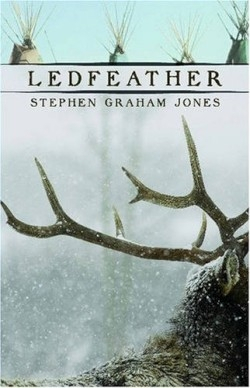LedFeather
Stephen Graham Jones is the author of five novels, including the award-winning The Fast Road and The Bird is Gone. With hallucinogenic lyricism and a nonlinear narrative, his new novel Ledfeather moves back and forth through time. A disjointed structure and multiple narrators provide a subtle exposition for the story and unique perspectives on the complexities of the main character, Doby Saxon.
Since his birth, Doby, a young Indian man living on a Blackfeet reservation, is exposed to poverty, violence, hatred, death, disappointment, and defeat, which he embraces as his legacy. Then he finds and becomes obsessed with letters dated back to 1883, written by an Indian agent to his wife. At first the epistles are eloquent and loving, but after confessing to committing an atrocity against the Blackfeet tribe, the agent’s letters break down into seemingly insane ramblings. Jones writes, “And the part of him the Indian agent wanted to keep buried had seen….Forgotten lodges with the sleeping dead….Dogs feeding on a horse while it was still alive….And now…a ghost, a reflection of the Agent’s own guilt and fears and self-pity.”
The letters amplify Doby’s angst and suicidal tendencies and he becomes a phantasm, an entity that represents the despair of a once strong and proud Indian nation that was reduced to its lowest dregs. He begins to live simultaneously on the thin line of converged realities between the present and the Blackfeet spirit world called the “Sandhills.”
Readers who enjoy the trippy books of Kathe Koja, a disjointed structure like Joseph Heller’s novel Catch-22, a plethora of characters as narrators like D.M. Thomas’s novel The White Hotel, and the concept of becoming “unstuck in time” like Kurt Vonnegut’s Slaughter House-Five will relish the Ledfeather journey. Jones’s mastery of reader manipulation is finely edged as he moves readers around the vast dreamscape of his prose and shows them how quickly the so-called banality of existence can become horrific.
Reviewed by
Lee Gooden
Disclosure: This article is not an endorsement, but a review. The publisher of this book provided free copies of the book to have their book reviewed by a professional reviewer. No fee was paid by the publisher for this review. Foreword Reviews only recommends books that we love. Foreword Magazine, Inc. is disclosing this in accordance with the Federal Trade Commission’s 16 CFR, Part 255.

